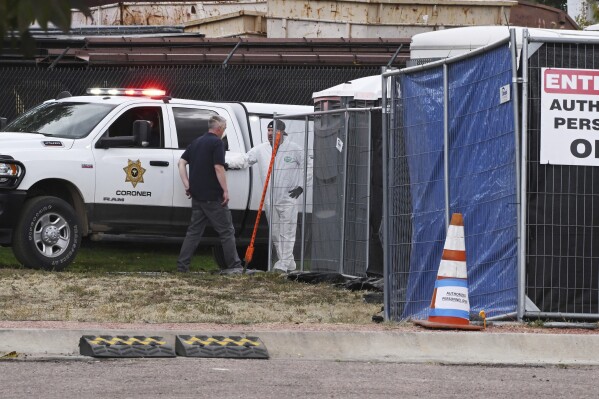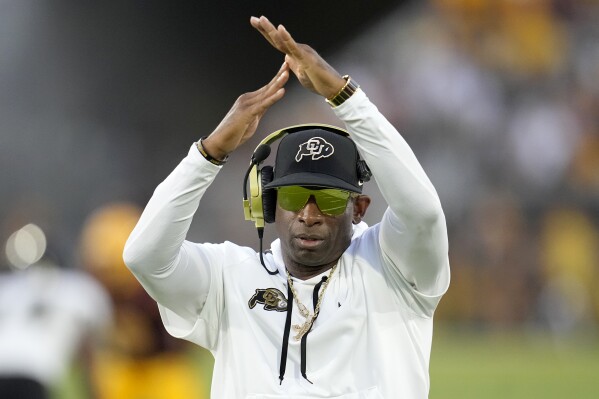Colorado judge strikes down Trump’s attempt to toss a lawsuit seeking to bar him from the ballot
DENVER (AP) — A Colorado judge has rejected an attempt by former President Donald Trump to dismiss a lawsuit that seeks to keep him off the state ballot, ruling that his objections on free-speech grounds did not apply.
Trump’s attorneys argued that a Colorado law protecting people from being sued over exercising their free speech rights shielded him from the lawsuit, but Colorado District Judge Sarah Wallace said that law doesn’t apply in this case.
The law also conflicted with a state requirement to get the question about Trump’s eligibility resolved quickly — before a Jan. 5 deadline for presidential candidates’ names to certified for the Colorado primary, Wallace wrote.
Citizens for Responsibility and Ethics in Washington claims in its lawsuit that putting Trump on the ballot in Colorado would violate a provision of the 14th Amendment that bars people who have “engaged in insurrection” against the Constitution from holding office.
 1 of 2 Colorado officers convicted in death of Elijah McClain after police stop, ketamine injection
1 of 2 Colorado officers convicted in death of Elijah McClain after police stop, ketamine injection
 At Colorado funeral home where 115 decaying bodies found, troubles went unnoticed by regulators
At Colorado funeral home where 115 decaying bodies found, troubles went unnoticed by regulators
 Colorado coach Deion Sanders calls late game times ‘stupidest thing ever invented in life’
Colorado coach Deion Sanders calls late game times ‘stupidest thing ever invented in life’
The group’s chief counsel, Donald K. Sherman, welcomed Wallace’s decision, which was made late Wednesday. He called it a “well-reasoned and very detailed order” in a statement Thursday. A Denver-based attorney for Trump, Geoffrey Blue, didn’t immediately return a phone message Thursday seeking comment.
The Colorado case is one of several involving Trump that stand to test the Civil War-era constitutional amendment, which has never been ruled on by the U.S. Supreme Court. Along with lawsuits filed in Minnesota and Michigan, it has a good chance of reaching the nation’s high court.
The lawsuits also involve one of Trump’s arguments in criminal cases filed against him in Washington, D.C., and Georgia for his attempt to overturn his 2020 loss — that he is being penalized for engaging in free speech to disagree with the validity of the vote tally.
The Colorado case will focus in part on the meaning of “insurrection” under the 14th Amendment, whether it applies only to waging war on the U.S. or can apply to Trump’s goading of a mob that attacked the U.S. Capitol on Jan. 6, 2021, to halt the certification of President Joe Biden’s win.
Trump’s attorneys dispute that it applies to his attempt to undo the election results. They also assert that the 14th Amendment requires an act of Congress to be enforced and that it doesn’t apply to Trump, anyway.
Trump swore a presidential oath to “preserve, protect and defend” the Constitution, but the text of the 14th Amendment says it applies to those who have sworn oaths to “support” the Constitution, Blue pointed out the sematic difference in an Oct. 6 filing in the case.
Both oaths “put a weighty burden on the oath-taker,” but those who wrote the amendment were aware of the difference, Blue argued.
“The framers of the 14th Amendment never intended for it to apply to the President,” he wrote.
The trial to determine Trump’s eligibility for the Colorado ballot is scheduled to start Oct. 30.
___
Gruver reported from Cheyenne, Wyoming.
Disclaimer: The copyright of this article belongs to the original author. Reposting this article is solely for the purpose of information dissemination and does not constitute any investment advice. If there is any infringement, please contact us immediately. We will make corrections or deletions as necessary. Thank you.





